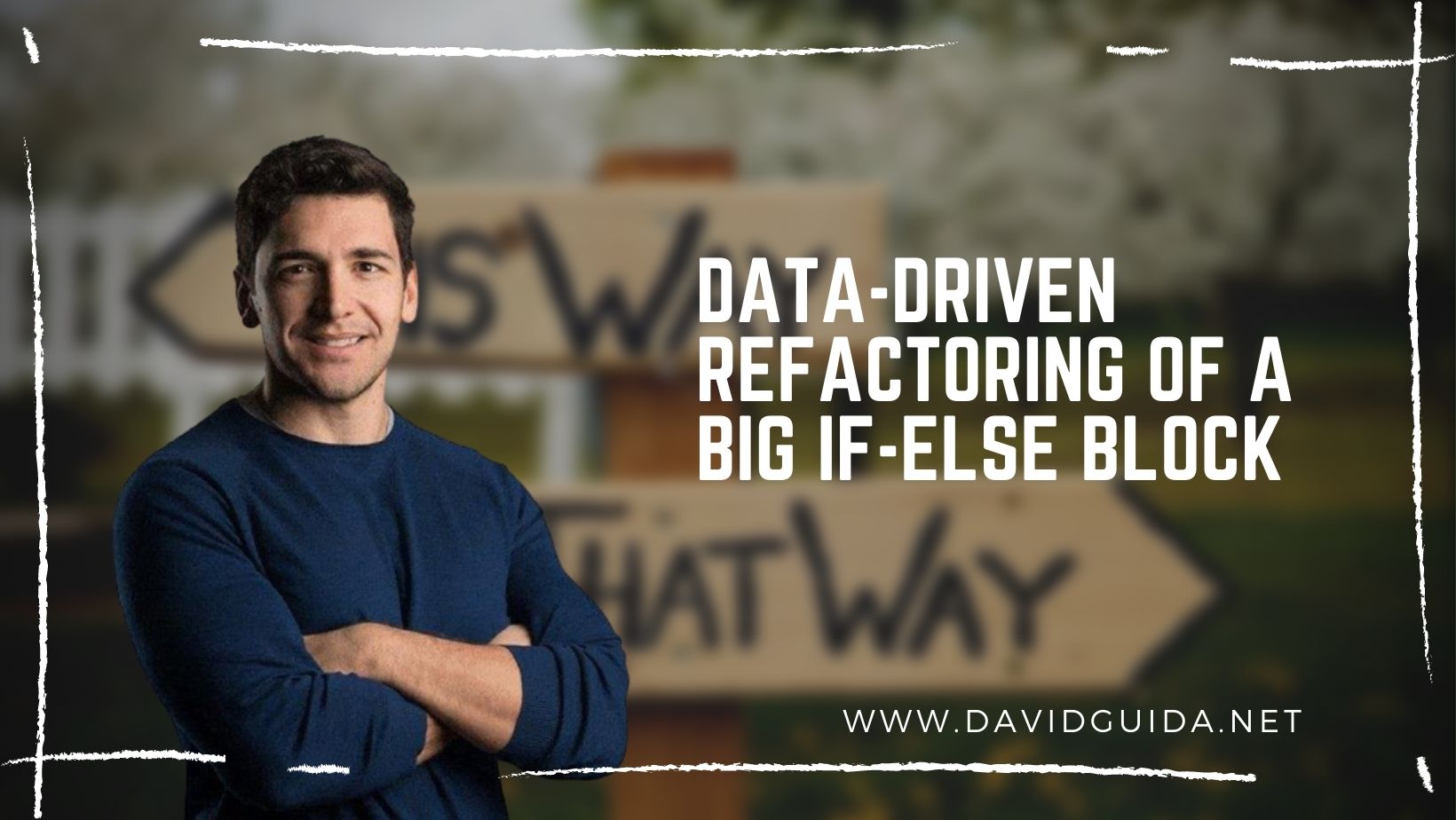
Data-driven refactoring of a big IF-ELSE block
Few days ago I was invited to an online coding session, hosted by Davide Bellone. Believe it or not, I’m a bit shy when it comes to live sessions and the idea kind of scared me at the beginning. But everybody and their dog is doing it nowadays so I wanted to give it a try :)
It all started from this tweet:
I need help with a refactoring problem.
— Davide Bellone 🌊 🗡 (@BelloneDavide) November 5, 2021
I have a list of 20 if-else statements like
if(value.StartsWith("foo")){}
else if (value.StartsWith("bar"){}
else if (value.StartsWith("baz"){}
How can I refactor that huge if-else?
We had few exchanges with few other folks, and then Davide suggested to host a coding session on Twitch and bring out our ideas.
I joined the party a bit late and (as usual) I was running out of time so I had to code in a rush.
Overall was a very nice experience, would totally do it again. I came totally unprepared and to be fair I’ve found it to be a very good learning exercise.
At the end I was not completely satisfied with my solution, also because I was not able to add some proper tests. So I took some time and few days later I pushed more changes to the repo.
So what was the problem? Say you have a class like this:
public class Foo : BaseFoo
{
public override string DoSomething(string path)
{
if (path.StartsWith("/tarantino/movies"))
{
_apiAccess.UpdateItem("Kill Bill");
return "Kill Bill";
}
else if (path.StartsWith("/tolkien/books"))
{
var item = _dbRepository.Get("LOTR");
_apiAccess.UpdateItem(item);
return item;
}
else if (path.StartsWith("/foofighters/songs"))
{
var item = _dbRepository.Get("The pretender");
_apiAccess.UpdateItem(item);
_dbRepository.Add(item);
return item;
}
else return string.Empty;
}
}
Nobody loves long chains of if/else statements and neither should you.
During the session, we took turns and refactored this code with three different approaches. The first two solutions used Chain of Responsibility, and a mixture of Factory and Strategy.
Mine was similar to the Factory one, but with a twist: I loaded the configuration from a file, shifting the setup to a data-driven approach.
Why? A bunch of reasons actually. Flexibility, as it’s definitely easier to change a config file rather than source code. Also, config files could and should be treated as code and stored in a repository.
The first step is to extract each branch into a “worker” or “handler” class, sharing a common interface:
public interface IHandler
{
string Handle();
}
And so we have a SongHandler, a MovieHandler and a BookHandler. Good.
Now we need a Factory that can create the proper handler for us.
And at this point our Foo class can be transformed into something like this:
public class FooDataDriven : BaseFoo
{
private readonly IHandlerFactory _factory;
public FooDataDriven(IHandlerFactory factory)
{
_factory = factory;
}
public override string DoSomething(string path)
{
var handler = _factory.CreateHandler(path);
return (handler != null) ?
handler.Handle():
string.Empty;
}
}
We inject the factory and use it to instantiate the proper handler for the given input. If no handler is found, we return some default value. Much better isn’t it?
No long chain of IFs, lower cyclomatic complexity and definitely much more testable.
We could stop here, but let’s push the bar a little higher. All we need is to add another Factory that would load the config from a file and build our FooDataDriven instance:
public class FooDataDrivenFileFactory
{
private readonly IDbRepository _dbRepository;
private readonly IApiAccess _apiAccess;
public FooDataDrivenFileFactory(IDbRepository dbRepository, IApiAccess apiAccess)
{
_dbRepository = dbRepository;
_apiAccess = apiAccess;
}
public FooDataDriven Create(string filePath)
{
var jsonData = File.ReadAllText(filePath);
var nodes = JsonSerializer.Deserialize<ConfigNode[]>(jsonData);
var creators = new List<HandlerCreator>();
foreach(var node in nodes)
{
Lazy<IHandler> handler;
switch (node.type)
{
case "book":
handler = new Lazy<IHandler>(() => new BookHandler(_dbRepository, _apiAccess, node.value));
break;
case "song":
handler = new Lazy<IHandler>(() => new SongHandler(_dbRepository, _apiAccess, node.value));
break;
case "movie":
handler = new Lazy<IHandler>(() => new MovieHandler(_apiAccess, node.value));
break;
default:
throw new ArgumentException($"invalid node type: {node.type}");
}
creators.Add(new HandlerCreator(path => path.StartsWith(node.filter), path => handler.Value));
}
var factory = new HandlerFactory(creators);
return new FooDataDriven(factory);
}
private record ConfigNode(string filter, string value, string type);
}
Did you like this post? Then




